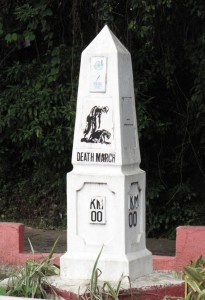Maywood never forgets Bataan Death March
Chronicle Media — September 9, 2015
Bataan Death March roadside memorial kilometer marker, found along the main highway on the Bataan peninsula, Philippines. (Photo by Danwinkelman)
It is about duty, honor and sacrifice. And it is about not forgetting, even after 73 years.
During all those years, Maywood residents and the Maywood Bataan Day Organization have remembered and honored the sacrifice of the village’s young men who suffered and died during one of the most infamous events of World War II.
The second Sunday in September has been Bataan Day in Maywood since 1942. On Sept. 13 this year’s Bataan Day observance will be held at 3 p.m. at the Veterans Memorial in Maywood Park, First Avenue and Oak Street.
Bataan Day honors the 192nd Tank Battalion of the U.S. National Guard, and specifically Company B, which was composed of men from Maywood.
The battalion was inducted into federal service on Nov. 25, 1940, and ultimately sent to the Philippines.
On the infamous Dec. 7, 1941, the Japanese launched simultaneous attacks on Pearl Harbor and the Philippines. American and Filipino forces held off the Japanese in fierce fighting on the Bataan Peninsula.
But after four months, the Allied troops, exhausted, short of everything, particularly food, and with no hope of reinforcement, surrendered on April 9, 1942.
The following day, some 70,000 American and Filipino soldiers were forced by the Japanese to march 70 miles to a prison camp.
During this infamous Bataan Death March thousands died in the stifling heat or were murdered by their Japanese guards. Of the approximately 54,000 men who reached the camp, many were ultimately sent to Japan as slave labor. Between 6,000 and 7,000 died in Japanese prison camps, during the remaining 3½ years of the war.
Of the 89 men of Company B, only 43 would return.
The Japanese commander of the Bataan Death March after the war was tried and executed as a war criminal.
In May 2009, Japan formally apologized for the Death March. Speaking at a convention of Bataan survivors, the Japanese ambassador to the United States said, “we extend a heartfelt apology for our country having caused tremendous damage and suffering to many people, including prisoners of war, those who have undergone tragic experiences in the Bataan Peninsula, the Corregidor island , Philippines and other places.”
But all those years between the Death March and the Japanese apology, Maywood never forgot.
The first Bataan Day in September 1942, was a national event, drawing more than 100,000 spectators, many bands, dignitaries and celebrities. And for decades, the Bataan Day parade was a highlight of the year for residents of Maywood and the western suburbs.
But even as Bataan and World War II recede into history, Maywood and the Maywood Bataan Day Organization have kept that moment in World War II in the present. In 1999, Maywood’s Village Board created a Veterans Memorial in the southeast corner of Maywood Park at First Avenue and Oak
Street.
And that same year, a photo of Company B — similar to a large photo
that for years hung in the lobby of the village’s Lido Theater — was installed in the history room of the Maywood Public Library.
And again this year, as it has for more than 70 years, Maywood will not forget. The observance is smaller now with the passage of time. No bands. No celebrities.
A service will be held at 3 p.m., Sept. 13 at the memorial in Maywood Park. Keynote speaker will be Stephen E. Gibson, board member of the Maywood Bataan Day Organization.
Guest speakers will be Wayne Wagner, past department commander of the
American Legion of Illinois, and Alena Grace S. Borra, Philippine Consul General in Chicago.
The observance is open to the public.
— Maywood never forgets Bataan Death March —



